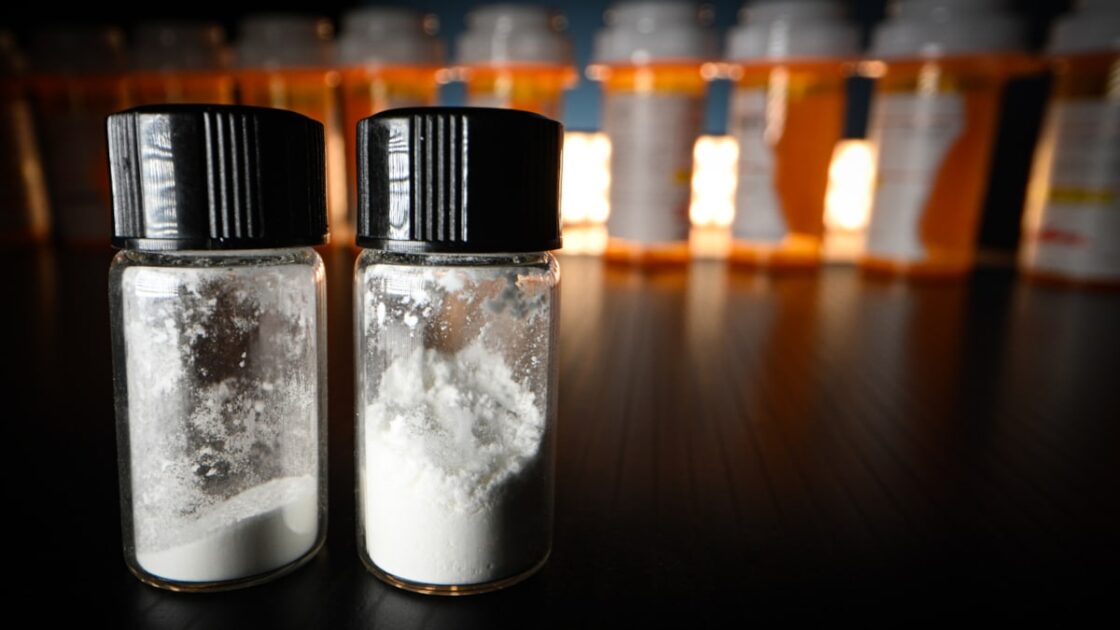What is Ketamine?
Ketamine is a dissociative anaesthetic that become a popular party drug due to its psychedelic and calming effects.

Ketamine is a dissociative anaesthetic used on both animals and humans in hospital settings. In recent years, it has become a popular party drug due to its psychedelic, calming and dissociative (making you feel like you are existing outside of yourself) properties.
Ketamine normally comes in the form of tiny white crystals, though it can also be clear, off-white or brown. The crystals are normally crushed into a powder and snorted. Powdered ketamine can also be dissolved and injected.
Ketamine is taken on its own but is sometimes also mixed with other drugs, such as cocaine (sometimes called CK or Calvin Kleins) or MDMA.
What are the short-term effects of ketamine?
The effects of ketamine depend on how much of it you take. It can be quite easy to take too large a dose at once, particularly if someone is a first-time user or inexperienced user. This is why it is always best to start with very small test doses and wait to see the effects before taking any more.
At smaller doses, ketamine can give a feeling of lightness, calm and euphoria. It can also interfere with coordination and depth perception, making losing your balance or falling over more likely. Thoughts may feel disjointed or muddled, and a room a person is in may feel larger than it actually is or otherwise unreal, both of which may feel pleasant or unpleasant. These effects typically last between 45–60 minutes, with users returning to baseline in 1.5–2 hours.
In larger doses, it may become difficult to move. Users may feel disconnected from their own bodies, sometimes called dissociation. Some hallucinations may occur at higher doses. Higher doses may also cause users to fall into a ‘k-hole’, a term for when someone using ketamine gets to a point where they cannot move and lose touch with reality and their surroundings. People in k-holes sometimes experience vivid hallucinations, though they may appear unconscious or unresponsive to those around them. Nausea and vomiting can also occur.
What are the risks when taking ketamine?
Taking ketamine is not without its risks, which include injury and even death. People who die or end up in hospital after taking ketamine have almost always combined it with other drugs, particularly alcohol.
Taking ketamine with stimulants such as cocaine and ecstasy can put strain on your heart. When ketamine is taken with depressants such as alcohol, GHB, benzodiazepines, codeine and opioids such as heroin, it may render the user unconscious. This can mean they are unable to protect their airway and can lead to them choking on their own vomit or saliva. Ketamine can also slow or stop a person’s breathing. People who have become unconscious after taking drugs should be placed in the recovery position and monitored. Find out more about what to do in the event of a drug emergency.
Ketamine can make you vulnerable to accidental injury in a few ways. Even small amounts of ketamine can affect coordination, which may make users more prone to falls.
Larger amounts can have anaesthetic effects meaning you will not be able to feel pain, and therefore may be more likely to injure yourself, fall, drown, pass out or suffocate due to the lack of awareness.
The effects of ketamine can be an overwhelming experience for the user and may cause agitation, stress or anxiety attacks. People who have schizophrenia or a history of psychotic illness, bipolar disorder or other mental health issues are advised to avoid taking ketamine, as the drug can sometimes bring back symptoms of psychosis.
If injecting, sharing needles can pass on diseases such as HIV and hepatitis, while injection itself carries its own risks, even if a clean needle is used.
What are the long-term effects of taking ketamine?
People who use ketamine regularly (more than a few times a week consistently) are at risk of damaging their organs, particularly the kidneys, stomach and bladder. The organs may not necessarily be able to recover from this damage.
Repeated ketamine use can sometimes also lead to abdominal cramping, though this seems to be separate to the bladder issues.
In the case of the bladder, the condition, called ketamine-induced ulcerative cystitis, begins with the need to urinate often and progresses to painful urination, blood in the urine and urinary incontinence (wetting oneself). It can also cause erectile dysfunction. Consistent, repeated ketamine use can lead to scarring in the bladder, which is permanent, and can make it harder to urinate or hold in urine. In some extreme cases, users have had to have their bladders removed due to the damage.
High frequency ketamine use can also lead to some cognitive problems, particularly issues with memory. Regular users may feel like they aren’t as sharp or able to think as clearly as they used to be. This effect however seems to fade when people stop using the drug.
Ketamine and addiction
Those who use ketamine regularly can develop a tolerance, meaning they need more and more of the drug to maintain the same high. Regular ketamine users may experience anxiety, low mood, cravings upon stopping and even some symptoms of withdrawal if the drug is suddenly stopped.
Though there is little evidence currently of physical dependence on ketamine being possible, people who use ketamine often can become psychologically dependent on the drug. Users may rely on ketamine to relax them at a party, or as a social crutch to fight feelings of social anxiety that might arise.
Psychological dependence can happen if a user relies on ketamine to help them escape their problems or to numb intense feelings that they do not want to deal with. Doing this regularly may mean that a user finds themselves unable to cope without it. Ketamine can become a psychological crutch for users who rely on it to help them feel better or get through bad periods in their lives, just as with alcohol, cannabis or gambling.
- If you think you might be dependent on drugs, there are a number of services that can help. Find a service near you here or contact the Drugs Helpline on 1800 459 459 to find out about options in your area.
Ketamine and the law
Under the Misuse of Drugs Act, it is illegal to produce, possess or supply the drug. It is also illegal to allow premises to be used for producing or supplying ketamine. Learn more about drugs and the law and your rights.
Harm reduction advice
If you choose to take drugs remember:
- Start with a very small test dose and wait at least two hours before taking more.
- Stay with your friends and do not leave anybody who is intoxicated on their own.
- Avoid mixing drugs and alcohol. Every time you mix drugs, including alcohol and prescription medication, you increase the risks.
- Always hydrate with water but don’t drink over a pint an hour.
- If you are dancing, remember to take breaks from dancing and give yourself time to cool down.
- Don’t be afraid to get help if you or a friend become unwell or feel suicidal after using drugs. Call 112 or 999
Support services
- Drugs.ie: Online information and support for drug and alcohol use. Includes a national directory of drug and alcohol services
- HSE Drugs, Alcohol, HIV and Sexual Health Helpline: Freephone 1800 459 459
- You can contact Youth Information Chat, an online service that can put you in touch with Youth Information Officers based all around the country, for more general information
Feeling overwhelmed and want to talk to someone?
- Get anonymous support 24/7 with our text message support service
- Connect with a trained volunteer who will listen to you, and help you to move forward feeling better
- Whatsapp us now or free-text SPUNOUT to 50808 to begin.
- Find out more about our text message support service
If you are a customer of the 48 or An Post network or cannot get through using the ‘50808’ short code please text HELLO to 086 1800 280 (standard message rates may apply). Some smaller networks do not support short codes like ‘50808’.






